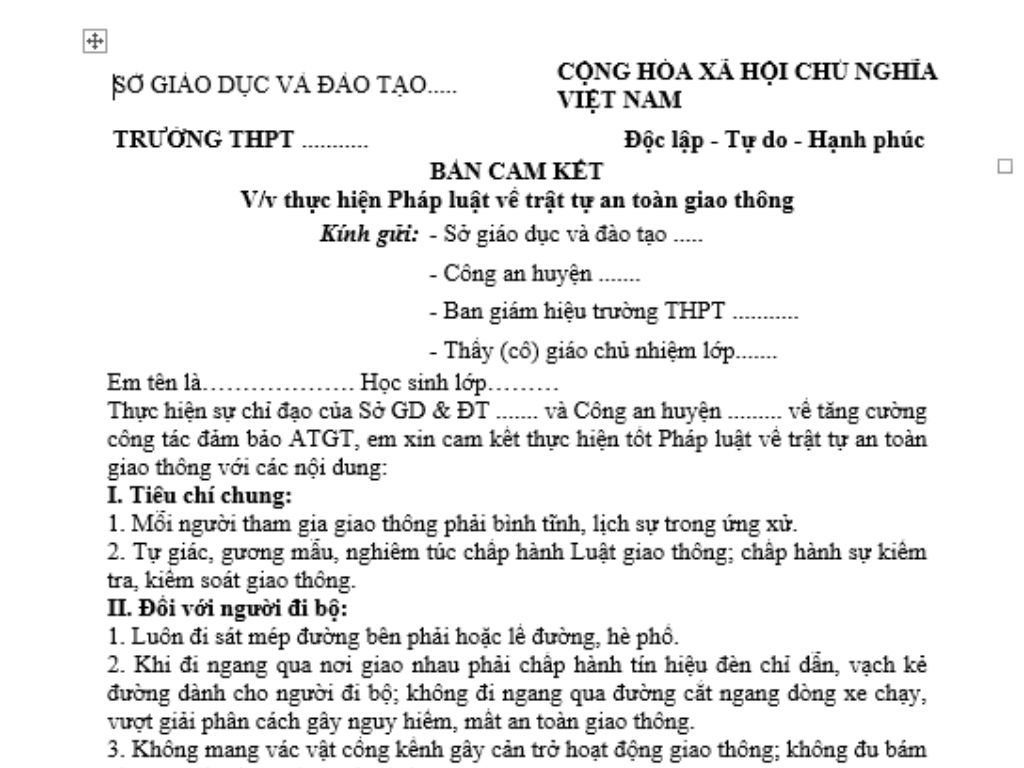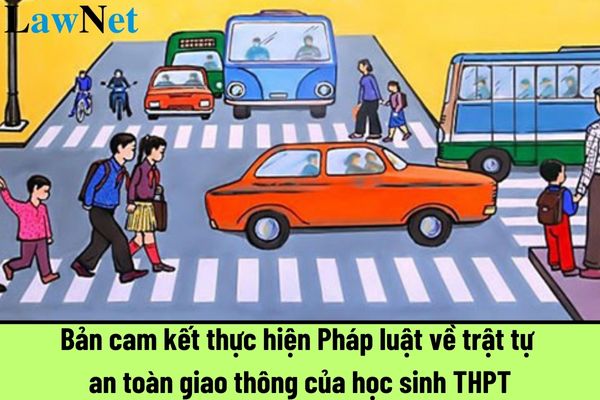What is the commitment template to comply with traffic safety laws for upper secondary school students in Vietnam?
What is the commitment template to comply with traffic safety laws for upper secondary school students in Vietnam?
Currently, the Education Law 2019 and related legal documents do not specifically stipulate a commitment template to comply with traffic safety laws for upper secondary school students in Vietnam.
You can refer to the following commitment template to comply with traffic safety laws for upper secondary school students in Vietnam:

The latest commitment template to comply with traffic safety laws for upper secondary school students in Vietnam Download

What is the commitment template to comply with traffic safety laws for upper secondary school students in Vietnam? (Image from the Internet)
What are the disciplinary actions against upper secondary school students who do not comply with the traffic safety commitment in Vietnam?
According to Article 38 of the lower secondary school, upper secondary school and multi-level school charter issued together with Circular 32/2020/TT-BGDDT:
Reward and discipline
1. Teachers, secondary schools and education authorities shall reward students with learning and training achievements in the following ways:
a) Commend them in front of the class or the whole school.
b) Grant them titles for students according to regulations.
c) Grant certificates and certificates of merit to students with outstanding achievements or exceptional improvement in learning or emulation movements and competition winners according to regulations and with permission from the Ministry of Education and Training.
d) Other ways to reward.
2. Students making a mistake during the learning and training process shall be corrected or disciplined in the following ways:
a) Give the student a reminder, directly support them in correcting their mistake.
b) Reprimand the student, inform the student’s parent(s) to have the parent(s) cooperate in supporting the student in correcting their mistake.
c) Suspend the student’s study at school for a definite period and take other correcting measures according to regulations from the Ministry of Education and Training.
Therefore, under the above provisions, upper secondary school students who do not comply with the traffic safety commitment in Vietnam can be disciplined by reminder, reprimand, or temporary suspension from school.
Who has the power to consider disciplinary actions against upper secondary school students who do not comply with the traffic safety commitment in Vietnam?
According to Clause 2, Article 12 of the lower secondary school, upper secondary school and multi-level school charter issued together with Circular 32/2020/TT-BGDDT:
Other councils in secondary schools
1. Emulation and reward council
The emulation and reward council shall be established at the beginning of each academic year to assist the principal with organizing emulation movements and proposing list of officials, teachers, staff and students deserving a reward. The emulation and reward council shall be established and led by the principal. Members of this council include the secretary of the Party Executive Committee, deputy principal(s), school council representative, trade union chairperson, secretary of the Ho Chi Minh Communist Youth Union (if any), leader of the Ho Chi Minh Young Pioneer Organization (if any), leaders of specialized teams, office team leader and homeroom teachers.
2. Discipline councils
a) The student discipline council shall be established to consider or lift disciplinary sanctions imposed upon students on a case-by-case basis. The principal has the power to issue decision on establishment of the student discipline council and lead this council. Members of the council include deputy principal(s), secretary of the Ho Chi Minh Communist Youth Union (if any), leader of the Ho Chi Minh Young Pioneer Organization (if any), homeroom teacher of the misbehaving student’s class, some teachers with experience in correcting misbehaving students and head of the parent committee of the school.
b) The official, teacher and staff discipline council shall be established to consider and propose disciplinary actions against officials, teachers and staff on a case-by-case basis. Establishment, components and operation of this council are provided for by law.
3. Advisory councils:
Advisory councils shall be established by the principal for each specific task. Duties, components and period of operation of advisory councils shall be decided by the principal.
Thus, under the above provisions, the Student Discipline Council shall be established to consider or lift disciplinary sanctions imposed upon students on a case-by-case basis.
Therefore, for upper secondary school students who do not comply with the traffic safety commitment, the Student Disciplinary Council has the power to consider disciplinary actions.

